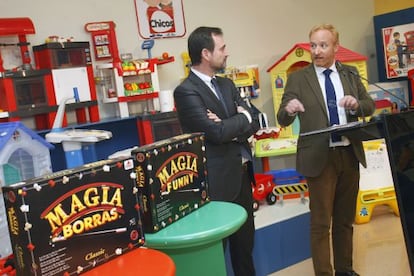Spain on European Union list of worst offenders for counterfeit toys
Brussels calling for awareness campaign to combat multi-million euro problem

Chinese-made counterfeit toys are costing Spanish manufacturers around €167 million a year – or 16.6 percent of sales – and are responsible for the destruction of 500 jobs. That’s according to a report by the European Union’s Office for Harmonization in the Internal Market (OHIM), the body responsible for registering EU trademarks.
The report places Spain in a group of EU nations that includes Romania, Bulgaria, Greece and Hungary, all of which are the worst affected by these fake goods, which are potentially dangerous.
Counterfeit goods make up around 12.3 percent of sales across the EU, with an estimated value of €1.4 billion.
The survey cites a long list of counterfeit items, including dolls, action figures, soft toys, table games, toy musical instruments, train sets and jigsaw puzzles
The survey cites a long list of counterfeit items – including dolls, action figures, soft toys, table games, toy musical instruments, train sets and jigsaw puzzles – but it excludes videogames, gaming software and bicycles.
José Pastor, the president of the Spanish and European Association of Toymakers, has called on the EU to impose “heavier sanctions” on counterfeit toy manufacturers, as well as to raise awareness of the problem, saying that Spanish companies are subject to strict controls that are reflected in their prices.
OHIM chief Antonio Campinos says that the fines imposed on counterfeit toymakers are too low. “This is a highly lucrative and virtually risk-free business,” he says, adding that those involved in the illicit trade are never sent to prison.
But Spain does not just have a problem with fake toys: the last three OHIM reports also highlight counterfeit cosmetics, textiles and sporting goods.
OHIM says that imitations are costing Spain some 498 jobs in the sector, 13.7 percent of the total
OHIM says that imitations are costing Spain some 498 jobs in the sector, 13.7 percent of the total. It estimates that throughout the EU, a total of 6,150 jobs have been lost as a result of fake toys. Most companies in the sector are small operations, employing around 10 people on average.
The report points out that, taking into account the direct and indirect effects of counterfeiting in the toy and games sector, the EU is losing out on around €370 million in taxes and social security contributions. OHIM provides no figures on the overall impact (including taxes) on a country basis.
The report is the fourth in a series carried out by OHIM on the economic repercussions of fake goods on EU industries. Antonio Campinos says that 50 percent of young people aged between 14 and 24 believe it is “smart” to buy fake goods, and is calling on the authorities to raise awareness of the problem, saying such practices “could cost their parents’ jobs.”
Tu suscripción se está usando en otro dispositivo
¿Quieres añadir otro usuario a tu suscripción?
Si continúas leyendo en este dispositivo, no se podrá leer en el otro.
FlechaTu suscripción se está usando en otro dispositivo y solo puedes acceder a EL PAÍS desde un dispositivo a la vez.
Si quieres compartir tu cuenta, cambia tu suscripción a la modalidad Premium, así podrás añadir otro usuario. Cada uno accederá con su propia cuenta de email, lo que os permitirá personalizar vuestra experiencia en EL PAÍS.
¿Tienes una suscripción de empresa? Accede aquí para contratar más cuentas.
En el caso de no saber quién está usando tu cuenta, te recomendamos cambiar tu contraseña aquí.
Si decides continuar compartiendo tu cuenta, este mensaje se mostrará en tu dispositivo y en el de la otra persona que está usando tu cuenta de forma indefinida, afectando a tu experiencia de lectura. Puedes consultar aquí los términos y condiciones de la suscripción digital.








































